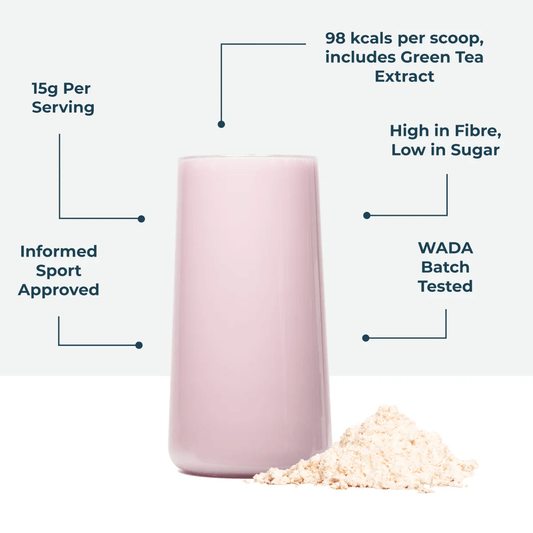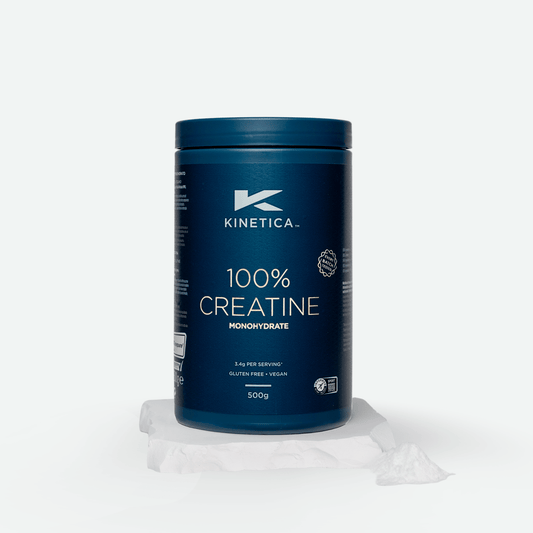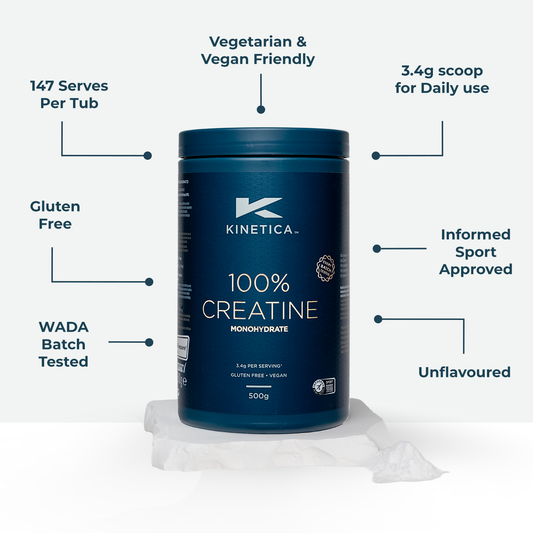Why Women Need More Protein in their Diet

While it’s often been marketed towards men, protein powder for women is definitely changing the game. As our understanding of female biology grows, it’s become evident that there are several benefits to women including more protein in their diet.
With this in mind, we’ll explore why more protein can be beneficial for women, and how you can adapt your diet to support your goals…
What does protein do?
Protein is one of three major food groups alongside carbohydrates and fats – the so-called ‘macronutrients’. Your body relies on these three, in addition to vitamins, minerals and other dietary nutrients, to build, grow, and maintain healthy function.
More specifically, protein is responsible for1:
- Structural support: proteins are building blocks for cells and tissues (everything from skin, to bones and muscle), and help cells maintain their shape. Hair is also primarily made of keratin, which is a protein.
- Muscle growth and repair: your body needs protein to grow and repair muscle tissue during everyday activity, and especially after exercise or injury. In particular, leucine (an amino acid) has been connected to stimulating muscle protein synthesis.
- Immune system support: your body uses certain proteins to create antibodies, which are what your body uses to fight off illness and infection.
- Hormone and enzyme production: your body creates various bodily hormones and enzymes from the proteins you ingest. Ensuring you get enough protein in your diet supports regular bodily functions like digestion, metabolism and growth.
- Weight management: protein, much like fibre, contributes to your feeling of satiety. Increasing the protein in your diet can help you feel fuller for longer, which is beneficial for weight management.
- Overall health: maintaining a balanced diet – indeed one with protein playing an important role – is vital to support your overall health and wellbeing, especially when you exercise.
Buy Now – Chocolate Mint Kinetica Sports Whey Protein
Do women need more protein than men?
Specific dietary requirements are inherently personal – factors such as your age, sex, body composition, activity levels, fitness goals, and more will all influence what you need from your diet. But, there are some general considerations that we can draw; one of which is that men and women typically have different protein requirements.
It’s often been thought that men have a higher baseline muscle mass, which means they have higher protein requirements than women. This historic perspective may be skewed however by the wealth of male-based studies (and dearth of female-based ones). In recent years, more research has been conducted for female-specific nutritional needs, and has suggested that women actually need more protein because they exhibit a higher rate of protein oxidation2.
Additionally, where men and women have shown to have relatively similar protein turnover rates throughout their lives, this changes even more in cases where significant hormonal changes are occurring. For example:
- During puberty: when boys gain muscle mass at a faster rate than girls, potentially influenced by the increase in testosterone3.
- During menstruation: protein oxidation during the luteal phase of the menstrual cycle is higher, which may indicate an increased appetite for, and requirement of, protein-rich foods3,4.
- During menopause: protein is important for age-related bone density decreases, and also helps to regulate weight management in menopausal women5,6.
- During pregnancy: research suggests that protein requirements increase during the second and third trimesters of pregnancy to support both parent and foetus7.
Outside of these physical processes, protein requirements also increase during periods of high activity, such as exercise. When you work out, your muscles go through stress which causes microtears in the tissue. To repair these, and to encourage more growth for the future, your body needs additional protein.
Learn more: for more in-depth information about the benefits of more protein for women, check out our guide to 5 Benefits of Whey Protein for Women…
Buy Now – Wild Raspberry Kinetica Sports Lean Active
How to improve your protein intake
You can see why getting more protein could be good for you, but so you know how to put this knowledge into practice? Understanding how much protein you should have in your diet as a woman will come down to your weight, your body composition, your fitness goals, where you are in your cycle etc – and for personal advice you should work through your plans with a dietician or doctor.
But, there are some blanket ways you can up your protein intake…
Protein-rich diet
Obviously, one way to increase your protein is to focus on getting a protein-rich but balanced diet. Where you can, you should incorporate more of the following foods8:
- Lean meats like chicken and turkey.
- Red meat like beef or lamb.
- Fish like salmon or tuna.
- Dairy products like milk and yoghurt.
- Dairy alternatives like soy milk, vegan cheeses.
- Legumes like beans, lentils and chickpeas.
- Nuts and seeds like walnuts and pumpkin seeds.
The general advice is to ensure you get approximately 0.75g of protein per kilo of body weight a day, which works out to around two palm-sized portions a day9. Note that this will vary depending on your chosen diet and activity plans.
If you’re struggling to make the most of your dietary protein, we’ve got some helpful tips below:
- Eat your protein first: eating your protein at the beginning of your meal means you avoid filling up on other foods, and may help with portion control as protein can help you feel full.
- Choose protein-rich snacks: eating a lot of protein per meal can be tricky, so consider swapping out your regular snacks for protein-rich alternatives.
Women’s protein supplements
Of course, if you are struggling to manage a balanced diet and meet your protein requirements, you might want to consider taking a protein supplement. Protein powders aren’t just for men; as women, they could be incredibly valuable with supporting your fitness goals.
Just look at our very own collection! At Kinetica Sports, we have a superb collection of protein supplements for women, including:
- Whey Protein Powder: made with hormone-free, grass-fed cow’s milk, our whey protein powder (for women and men) offers a delicious, creamy mouthfeel and 22-23g of protein per 30g scoop!
- Clear Whey Isolate: lower in sugar and lactose than regular whey, our Clear Whey Isolate is a refreshing alternative to milkier protein drinks packing a whopping 24g of protein per scoop.
- Lean Active Diet Whey Protein: at 15.7g of protein and only 93 calories per scoop, this is a wonderful alternative protein powder for women looking to lose or manage their weight.
- Plant Protein Powder: follow a vegan or plant-based diet? Our Plant Protein mixes easily with water or plant-based milks and offers 23g of protein per serving. What’s not to like?
Your why, our how: choose Kinetica Sports women’s protein supplements
At Kinetica Sports, we’ve made choosing the right women’s protein supplement for you a breeze. While we have a selection of tasty flavours and different types of protein supplements, they all have one thing in common: supreme quality.
Before being available for sale, all of our protein supplements undergo batch testing to ensure they’re in compliance with strict Informed Sport and WADA regulations. This ensures that they are safe, consistent, and of the utmost quality to support your fitness goals.
And, considering our Whey Protein won Best Protein Powder at the European Specialist Sports Nutrition Awards 2024, you don’t just have to take our word for it.
Whether you’re a weekend warrior, or a pro athlete, explore our collection today to find your new training essential. Don’t forget to check out our other collections too, like our Creatine Monohydrate, or pick up one of our Bundles for extra value.
We think you’ll also like… The Ultimate Guide to Pre-Workout Supplements | Are Mass Gainer & Protein Powder The Same? | Is Whey Protein Vegan?
Disclaimer: this article is not, nor is it intended, as medical advice. Before making changes to your diet, consult your doctor or dietician for more information.











